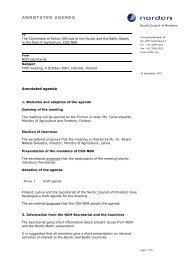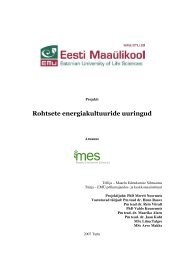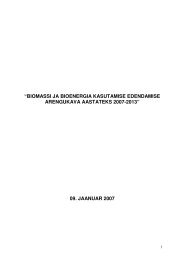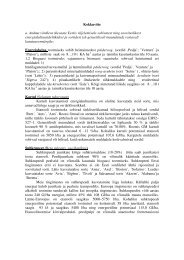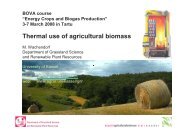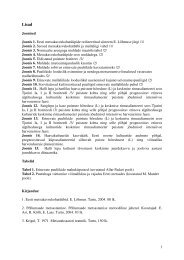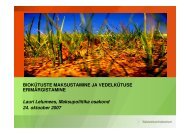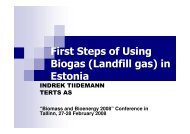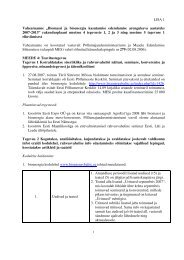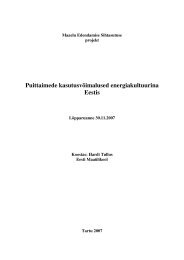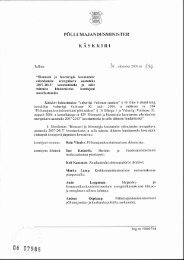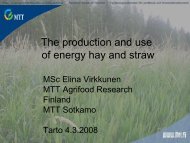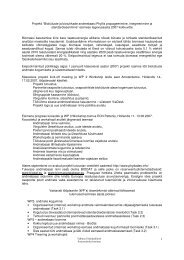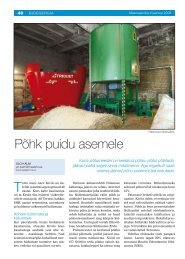Põllumajandusministeeriumi ja Maaelu ... - bioenergybaltic
Põllumajandusministeeriumi ja Maaelu ... - bioenergybaltic
Põllumajandusministeeriumi ja Maaelu ... - bioenergybaltic
Create successful ePaper yourself
Turn your PDF publications into a flip-book with our unique Google optimized e-Paper software.
The taxation measure aimed directly to promotion of bioenergy is the exemption of biofuels<br />
from excise tax. According to the Alcohol, Tobacco and Fuel Excise Duty Act the biofuels are<br />
exempted from the fuel excise duty in case the relevant permit has been obtained from the<br />
European Commission (EC) for the exemption. The permit was received – by decision of the<br />
EC Estonia has the right to apply excise tax exemption on biofuels for six years (since 27 July<br />
2005).<br />
Up to now, the impact of this tax exemption has been marginal: the Tax and Customs Board<br />
has issued only 11 permits (as of 1 December 2007) for production and releasing for<br />
consumption of biofuel. In 2006, the permit owners have produced almost five thousand tons<br />
of biofuel, 1.17 thousand t of which has been released for consumption – this is an extremely<br />
small quantity. Nevertheless, some positive changes have taken place: in June 2007<br />
construction of a large biodiesel production plant was started in Paldiski. The planned output<br />
of this plant is 300 tons of fuel per day.<br />
Another taxation measure supporting use of biomass fuels indirectly is the imposition of<br />
pollution charges on combustion of fuels. In the end of 2005 the Parliament of Estonia –<br />
Riigikogu – passed the Environment Charges Act that may be considered as a first element of<br />
ecological tax reform in Estonia. The Act provides an obligation for owners of combustion<br />
equipment to pay pollution charges for several pollutants emitted into air. The pollution charge<br />
for release of carbon dioxide into ambient air had been introduced already in 2000. Since 1<br />
January 2008 the CO 2 charge has to be paid by all enterprises producing heat, excluding the<br />
ones firing biomass, peat or waste.<br />
It has to be noted that the foreign trade of biomass needs more analysis in relation to emission<br />
trade of GHG. For example, Estonia exports almost all of the quite large production of wood<br />
pellets – in 2006 more than 250 thousand tons of pellets were exported. This results in loosing<br />
essential amount of potential emission reduction, as in case of utilizing this amount of wood<br />
fuels in Estonia (replacing fossil fuels) it could enable to reduce here the CO 2 emission by<br />
330 – 620 thousand tons (depending on fuel). Currently, this essential amount of emission<br />
reduction is included in GHG balances of countries importing pellets from Estonia.<br />
As a conclusion on current situation, it has to be emphasized that up to present the measures<br />
supporting investments have been of a non-regular character. The measures supporting<br />
operations have been mainly indirect ones, the only exception is the exemption from excise<br />
duty for biofuel. It is recommended to have measures with more stable character, but<br />
introduction of new measures must be preceded by defining national priorities which in turn<br />
presumes thorough impact analysis of various aspects, including life cycle analysis based on<br />
energy, environment and economic aspects considering Estonia’s circumstances. Also, a<br />
question of 'food versus fuel' must be considered: how much land and other resources are<br />
available, how should they be used and what are the priorities in this aspect. And, last but not<br />
least, all national support measures for production and use of biomass must comply with<br />
Community state aid policy, i.e. there should not be undue distortions of competition.<br />
116



